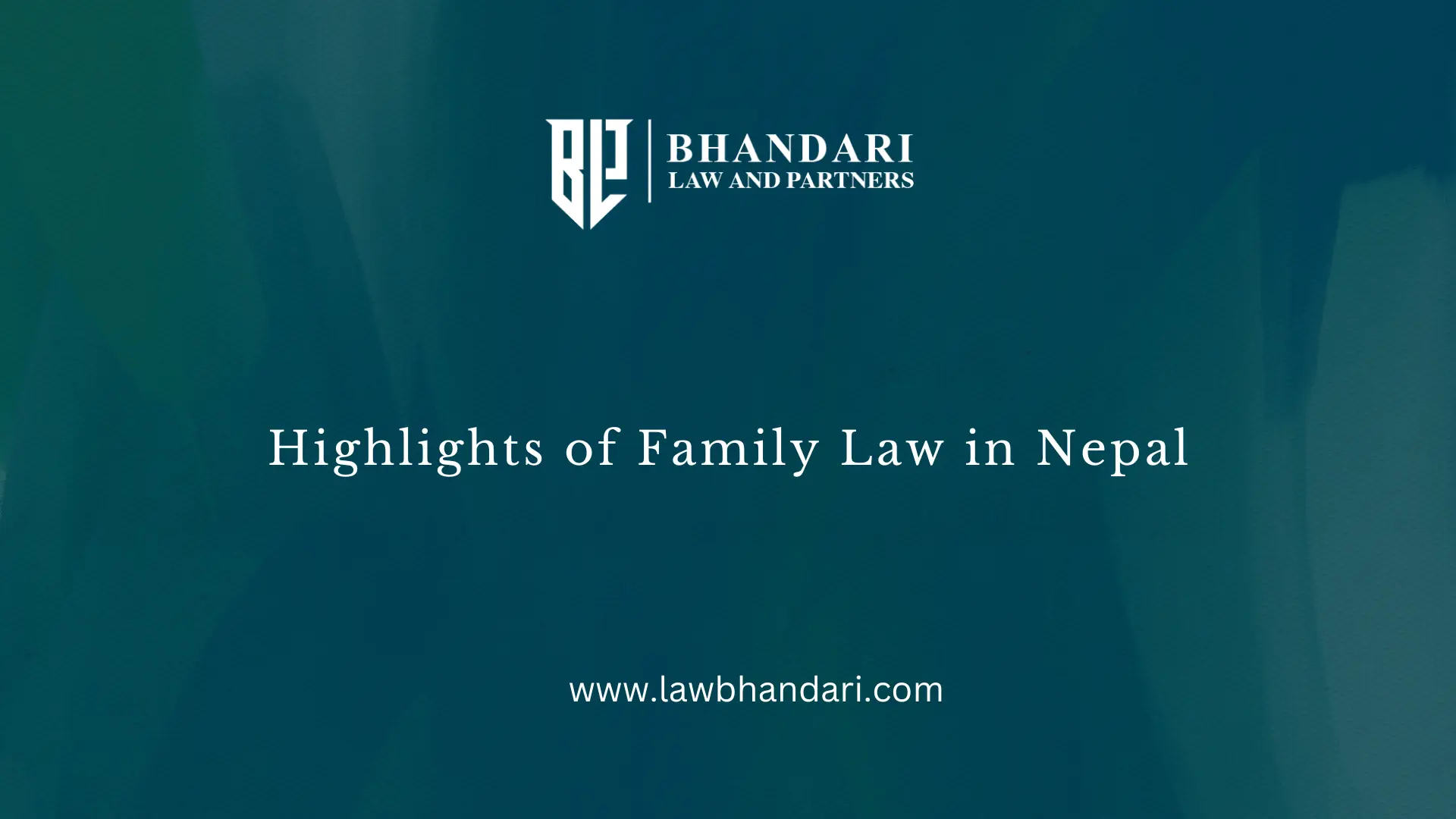
Family Law in Nepal | Best Family Lawyers in Nepal
01. Background
This article explains details regarding the family law in Nepal. Chapter 3 of National Civil Code, 2074 ("NCC") includes legal provisions related to family law. The chapter includes following legal matters;
- Marriage
- Consequences of marriage
- Divorce
- Child Custody
- Partition of Property
- Will
- Adoption
- Succession
02. Marriage
It explains about the legal provisions regarding the registration process of marriage through different institutions.
2.1. Marriage Registration in Nepal through Court
Nepalese citizens living in Nepal or abroad as well foreign citizens can do court marriage in Nepal. The Court Marriage can be concluded under the jurisdiction of District Court.
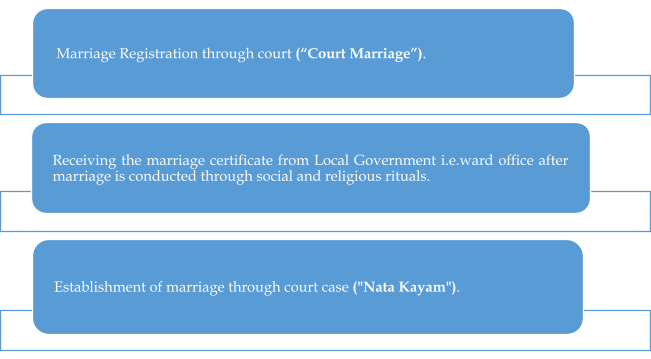
*Note: The existing law also has provisions regarding marriage registration in Nepal through Embassy or Consulate Office; however, such practice has not been adopted by the Embassy or Consulate Office yet.
2.2. Process of Court Marriage in between two Nepalese spouse
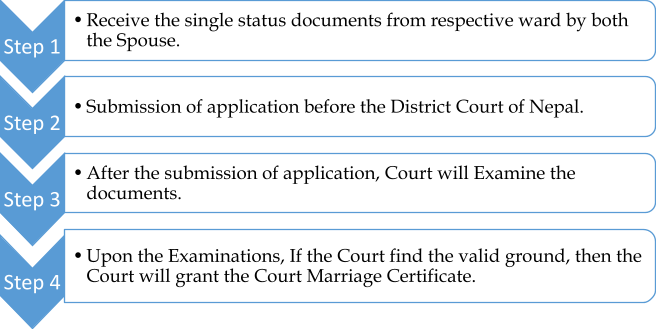
*Note:
-
Single Status Certificate means recommendation letter that needs to be received from the ward office (Based on their respective Citizenship) stating the spouse has not been married yet.
-
Please note that, couple needs to apply for court marriage within 30(Thirty) days of receiving the single status certificate from their respective ward.
-
Both individuals should present physically at court.
-
At the day of marriage, witnesses of both the parties should present physically.
2.3. Documents required for court marriage between two Nepalese Spouse
The following documents are required for the registration of marriage in between both Nepalese citizens:
| S.N. | Documents Required |
|---|---|
| 1. | A notarized copy of citizenship of both the man and the woman, |
| 2. | A notarized copy of citizenship of each witness from the both sides, the man and the woman, |
| 3. | A temporary residence document stating individual living in particular ward before 15 (Fifteen) days is required when one or both of the parties are permanently resident of a district other than where the marriage being concluded. |
| 4. | The recommendation letter of regarding unmarried/single/divorce of both the man and the woman from local wards office of their concerned permanent address, |
| 5. | 4 (Four) copies of passport size photo of each, both man and woman, |
*Note: A copy of divorce is required, if the man or the woman were previously divorced with another person.
2.4. Timeline for court marriage in Nepal
After all the required documents are received, it shall take 1(One) to 2(Two) working days.
2.5. Receiving the marriage certificate from Local Government i.e. ward office after marriage is conducted through social and religious rituals.
Pursuant to section 76 of NCC, the marriage shall be registered at ward office in case the marriage is done through the social and religious rituals. After submission of the application at the respective ward office, the ward shall examine the evidence and shall grant the marriage certificate.
The following documents are required along with the application for the registration of marriage at ward;
-
Copies of Citizenship of both bride and groom,
-
3/3 copies of passport size photo of both bride and groom.
-
Evidence related to marriage
2.6. Establishment of marriage in case of court case ("Nata Kayam")
In context of Nepal, the marriage also can be established through court case in case any party deny to accept the marriage relationship. Appropriate evidence of marriage has to be provided to the court.
2.7. Marriage to be deemed concluded if child is born from physical intercourse
If it is established that a woman has given birth through sexual relations with a man, marriage between such a man and a woman shall, be deemed to have been concluded by the fact itself.
*Note: On the following situations, the marriage shall not be concluded;
-
If a child born due to the consequence of rape,
-
If a woman delivers a child by conceiving pregnancy from a physical intercourse with a man within the relationship punishable by law on incest,
-
If the age of marriage is not complete.
-
If there is situation which causes polygamy.
2.8. Consequences of marriage
Chapter 2 of NCC has explained about the legal provisions regarding the consequences of marriage. The following are the consequences of marriage;
-
Considered as husband and wife,
-
Relation and obligation of husband and wife,
-
Husband's home to be considered as residence,
-
To be considered each other's agent,
-
To provide, or cause to be provided, maintenance in accordance with reputation,
-
Household affairs to be managed by consent,
-
Not to preclude from exercising profession, business or occupation.
03. Divorce Law
Once the marriage is conducted, then the marital relationship can be terminated only through divorce by submitting the application before court.
Divorce can be conducted:
-
Either through the Mutual Consent Between Husband and Wife or
-
Initiate the divorce through husband or wife (without consent)
*Note: Divorce can be initiated either through husband or wife. There is no restriction on the same.
3.1. Procedure of Divorce in Nepal (With Consent)
Pursuant to Section 93 of NCC, husband and wife in their mutual understanding can get divorced at any time. The following procedures are being followed while divorce is done in mutual understanding of husband and wife:
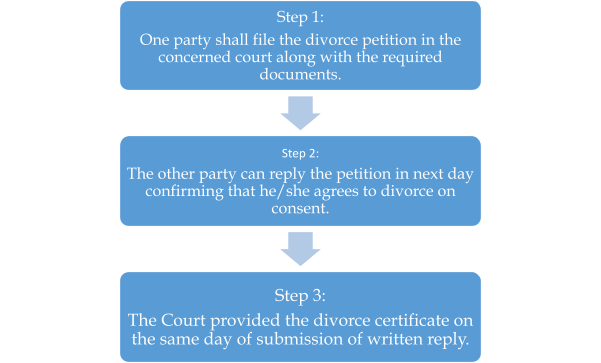
The divorce in mutual understanding can be completed within 2(Two) to 3(Three) working days.
3.2 Procedure of Divorce in Nepal (Without Consent)
The following procedure has to be followed for the divorce process (without mutual consent divorce.
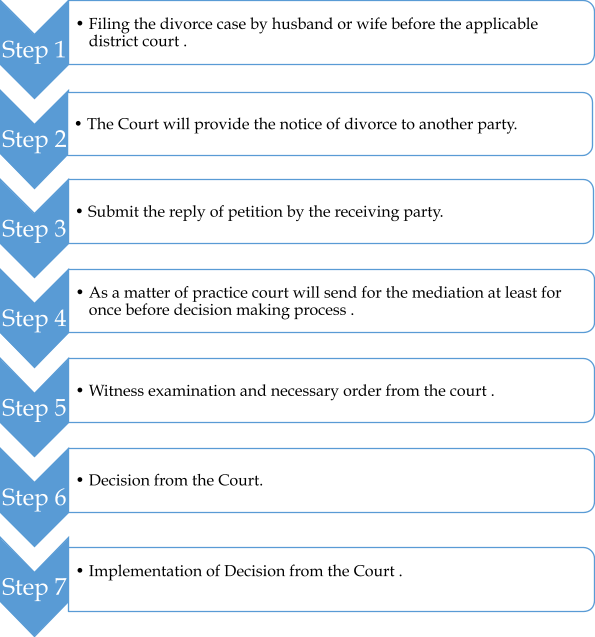
*Note: During the divorce process the court needs to decide on the matter of partition of property among the husband, wife and children.
Wife has right to exempt the property if she does not wish to take the property from husband.
It may take 12 to 14 months for completion of divorce in Nepal.
3.3. Grounds for the initiation of divorce in Nepal
Divorce can be done in various grounds. The following are the grounds for the divorce in Nepal:
3.4. Husband may effect divorce on following grounds
-
If the wife has been living separately for 3 (Three) or more consecutive years, without consent of the husband, except where the husband and wife are living separately after obtaining their partition share or separating bread and board in accordance with law,
-
If the wife expels her husband from the house or deprives the husband of maintenance costs,
-
If the wife commits an act or conspiracy likely to cause the grievous hurt or other severe physical or mental pain to the husband,
-
If the wife is proved to have made sexual relation with another men.
3.5. Wife may effect divorce
Pursuant to section 95 of NCC, the wife may file the divorce. Under the following conditions, wife may effect the divorce:
-
If the husband has been living separately for 3(Three) years or more consecutively, without consent of the wife, except where the husband and wife are living separately after obtaining their partition share or separating bread and board in accordance with law,
-
If the husband deprives the wife of maintenance costs or expels her from home,
-
If the husband commits an act or conspiracy likely to cause grievous hurt or other severe physical or mental pain to the wife,
-
If the husband gets into the marital relationship with other,
-
If the husband is proved to have made sexual intercourse with another woman,
-
If the husband is proved to have raped the wife.
3.6. Special Condition for the Divorce for person living in abroad
A Nepali Citizen or foreign Citizen living abroad can file the divorce case in Nepal without their presence in Nepal.
One need to execute Authorized Power of Attorney ("POA") and had to approve the same from the respective Nepal Embassy located at foreign country.
*Note: POA can granted either to relatives, friends, Lawyers or any person living in Nepal to initiate the case.
3.7. Partition of Property during Divorce
Pursuant to NCC, partition of the property among husband, wife and children shall be divided equally.
In between the case wife has right to claim the alimony from her husband with monthly expenses on the basis of husband's income and property until the partition is effected.
During the divorce process wife can take property in cash in hand or property in lump sum as well.
3.8. Custody of children after divorce
Both the mother and father of children can take care of the children after the divorce. Despite, in case of the custody the following practices have to be followed:
| S.N. | Child Age | Custody with |
|---|---|---|
| 1. | Below 5 years | Mother will be responsible either she concludes another marriage or not. |
| 2. | Above 5 years | In the case of a minor above five years of age, except where the mother has concluded another marriage, under the custody of the mother, if she so desires, |
| 3. | After the Completion of 10 years | The opinion of minor has to be obtained. |
*Note: In the circumstances rather than mentioned in above table no 1 and 2, the custody will remain with the father.
Despite, the matrimonial relationship between husband and wife has been legally ended, the obligation of father and mother towards children remain exist.
Please read our detailed publication on divorce law in Nepal.
04. Partition of Property
Chapter 5 of NCC, includes the provisions regarding partition of the property in the context of Nepal. The chapter discuss on the following subject matters;
4.1. Who can claim for the property?
According to the chapter 5 of NCC, Section 205 has defined coparceners as the husband, wife, father, mother, son, and daughter for the purpose of the property apportionment. The coparceners can claim the property on the following grounds;
-
Son and daughter who are born from the parents whose matrimonial relationship is to be dissolved,
-
Obtain partition share from mother,
-
Obtain partition share from father or husband,
-
Obtain partition share by latter wife or child from part of father or husband
*Note: If any woman coparcener got pregnant during the partition of the property, the child given birth by that woman coparcener is also recognized as the coparcener and has right on the property share. If, the child born dead, the property share of that child shall equally divided on other coparceners.
4.2. When can coparceners get separated?
With the mutual consent between the core family members, they can get separated after the partition of the property at any period of time. Furthermore, on the following grounds coparceners can get separated;
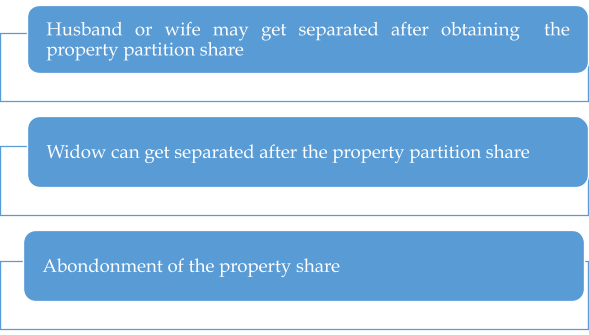
*Note: Any coparceners can relinquished the property partially or fully or in case of property can take cash or some kind in place of the property.
The relinquishment of the property share in case of the minor coparceners, cannot be exercised by the other coparceners.
The joint property shall be divided equally among the coparceners and shall be in the written form. During the partition of the property, the collective loan and property shall be equally divided among the coparceners.
05. Will and Succession
In Nepal, the matters of will and succession are primarily governed by the Muluki Civil Code, 2074. These laws ensure a structured legal framework for the transfer of property after person’s death whether through a written will or by default succession rules in the absence of one. The law recognizes both testamentary succession (through will) and intestate succession (without will).
5.1. Will
A will is a legal declaration made by a person during their lifetime regarding the distribution of their property after death. The Muluki Civil Code provides clear rules regarding the execution and validity of wills in Nepal.
Key Provisions Related to Will:
-
Any person who has attained 18 years of age and is of sound mind can make a will regarding their property.
-
Form and Execution:
The will must be in writing, signed by the testator (the person making the will) and attested by at least two witnesses. It must clearly specify the distribution of property. -
Revocation of Will:
The testator can amend or cancel the will at any time before death. -
Limitations:
A person cannot make a will in a manner that deprives the legal heir(s) of their reserved rights if any are protected by law.
5.2. Succession
Succession refers to the legal process through which a deceased person's property, rights, and obligations are transferred to their legal heirs.
There are two types of succession under Nepali law:
A. Testamentary Succession (Through Will):
If a valid will is made, the property is distributed as per the wishes stated in the will. The heirs or beneficiaries named in the will inherit the property.
B. Intestate Succession (Without Will):
If a person dies without making a will, succession is governed by the default rules of inheritance under the law.
5.3. Order of Legal Heirs (Intestate Succession)
According to the Muluki Civil Code, the order of preference for heirs is generally as follows:
-
Spouse living in the undivided family
-
Children (sons and daughters)
-
Widowed daughter-in-law living in the undivided family
-
Parents (father, mother, stepmother)
-
Grandchildren
-
Other close blood relatives, as specified in the Code
In the absence of any of the above heirs, the property may ultimately devolve to the Government of Nepal.
06. Adoption
If a person treats another’s child as their own son or daughter, that child shall legally be considered an adopted son or daughter. Chapter 8 of NCC has the legal provisions regarding the adoption. The adoption shall be exercised in a manner to protect the best interests of the child.
6.1. Who can adopt the child?
The following individuals or couple are eligible to adopt a child:
-
A married couple who have not had a child of their own within 10(Ten) years of marriage.
-
A woman who is:
-
Unmarried and at least 45(Forty-Five) years old, or
-
A widow, divorced, or judicially separated,
-
And does not have any biological or adopted children.
-
A man who is:
-
Unmarried and at least 45(Forty-Five) years old, or
-
A widow, divorced, or judicially separated,
-
And does not have any biological or adopted children.
6.2. Who cannot adopt the child?
The following individual or couple cannot adopt the child;
(a) A person who is mentally unfit or of unsound mind,
(b) A person who has been convicted by a court for a crime involving moral wrongdoing,
(c) A person who does not have enough financial resources to provide for the minor’s maintenance, health care, education, sports, entertainment, and overall care.
*Note: When a husband or wife living in a joint family adopts a child under this law, they must obtain each other's consent.
6.3. Grounds for non-eligibility for adoption
A person cannot be adopted as a son or daughter if:
a. He or she completes 14(Fourteen) years,
b. He or she is only son or daughter of their biological parents,
c. He or she has already been adopted once,
d. He or she is more closely related to the adoptive person than what is legally allowed,
e. He or she is not a citizen of Nepal.
6.4. Difference of age between adopter and adoptee
- The adopter must be at least 25(Twenty-five) years older than the adoptee.
- However, this age requirement does not apply if the adoptee and adopter are relatives within 3 (Three) generations.
6.5. Procedures for effecting adoption
The following procedures shall be considered while effecting adoption
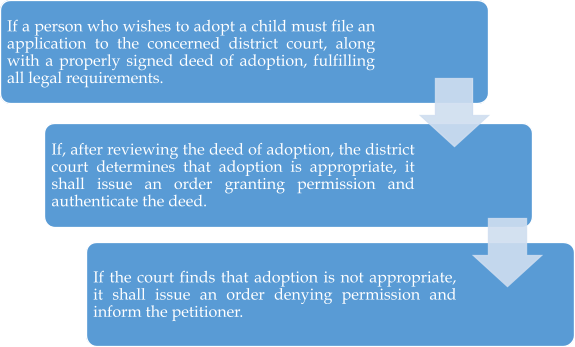
*Note: Consent Required for Adoption:
-
To adopt a child, the adopter must obtain written consent from both the child's father and mother, if they are both alive.
-
If only one parent is alive, the adopter must obtain written consent from the surviving parent.
Date of Publication: 16 August 2025
Disclaimer: This article is published just for information purpose only. It shall not be taken as the legal advice, advertisement, personal communication, solicitation or inducement. Bhandari Law and Partners or any of the team members of the firm shall not be liable for the consequence arising of the information provided. As the factual situation may be different on your case, thereof if you need further legal advice on the subject matter, please Contact Us.
Related Professionals: